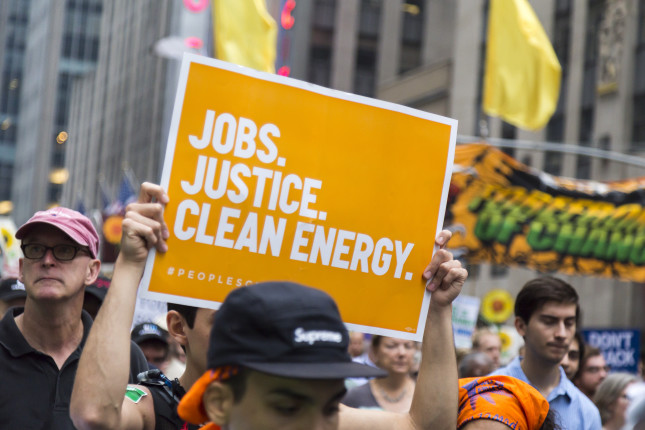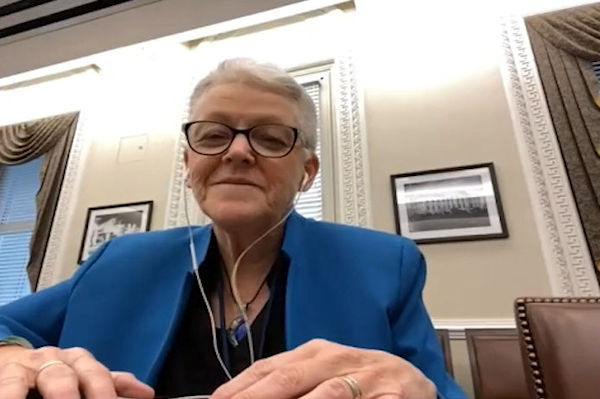-
Top Biden Climate Advisor, Others Preview 2021 Energy and Enviro News
February 12, 2021 By Joseph A. Davis
White House climate advisor Gina McCarthy gave an exclusive preview of the Biden administration’s Jan. 27 rollout of climate initiatives to more than 1,100 journalists, environmental experts and others watching a virtual program organized the same day by Society of Environmental Journalists.
The SEJ’s ninth annual Journalists’ Guide to Energy & Environment look-ahead event, entirely online due to the pandemic, was hosted for the second year by the National Geographic Society and co-sponsored by the Wilson Center.
Even as President Biden was introducing his massive climate plan at a “Climate Day” media event at the White House (check out the subsequent news coverage), McCarthy made her SEJ appearance in a pre-taped interview with CBS News’ Jeff Berardelli.
McCarthy, who Berardelli told the audience holds “the most important climate job in the world” as Biden’s national climate advisor, will run point in a “whole of government” effort to get the United States (and the planet) back on a more aggressive track after four years of unraveling of the Obama climate legacy by former President Trump. Biden administration agencies expect to undo scores of Trump climate rollbacks.
How will McCarthy do it? “I’ve got a lot of friends,” joked the former Obama Environmental Protection Agency administrator. “It’s not going to be me running around doing that, which is really the gift this position has given me.” Added McCarthy, on a more serious note: “We have to pay attention to science and facts. We recognize that climate change is a catastrophe, but also an unbelievable opportunity to build a future that we really want to have today. It’s going to be about the U.S. leading the world, not the U.S. catering to polluters.”
The new Biden plan is ambitious and exciting, McCarthy said. “We’re looking at a power sector that is clean by 2035.” She said the administration planned for a “just transition,” setting up an environmental justice task force to support communities that might otherwise be left behind.
McCarthy itemized most of the programs in Biden’s executive orders rolled out that day. “And you haven’t even seen the Build Back Better plan, which is going to come a little bit later,” she said. That plan, likely to include major federal investment in green jobs and infrastructure that will help climate, may look a bit like what the Green New Deal had envisioned. But much of it will need to be passed by Congress.
Berardelli asked McCarthy about one issue SEJ cares about especially—journalists’ access to officials. She spoke of a renewed science integrity policy that would allow it. ”Which means we can speak with you again, with definition. You can ask us questions. We can be transparent and accessible to you because we won’t have anything to hide.“
McCarthy, over the years, had always been one EPA leader willing to connect with environmental journalists—even at times of tension. SEJ President Sadie Babits recalled McCarthy appearing (quite comfortably) at SEJ’s annual conference in 2009. “I have been hanging out with you guys and gals for a long time,” McCarthy said.

Senate climate leader ‘very optimistic’
Sen. Sheldon Whitehouse (D-R.I.) appeared later in the SEJ program, interviewed by National Geographic explorer Enric Sala. In a way, this too was historic. Whitehouse had been known for years for his weekly speeches on the Senate floor urging Congress and the nation to act on climate.
In the wake of the Biden announcements and of the United States rejoining the Paris Climate Accord, Whitehouse took the occasion with SEJ to announce that he was ending the series of speeches. “This week will be my last,” Whitehouse said, adding the new developments made him “very optimistic. … I’m closing down the weekly speeches because I have confidence now at last that the Biden administration will tackle this problem.”
Whitehouse said Biden’s “Build Back Better” infrastructure bill would have an important climate component and he thought it could be passed. Whitehouse was also hopeful for another climate bill beyond that—the “big” one—coming from the Biden administration and being passed in the current Congress. He is also at work on several oceans bills.
Climate legislation depends on making the case to Republicans, Whitehouse maintained. “I think it’s going to be very important for the Biden administration to take on and expose once and for all this false climate denial apparatus that the fossil industry has built,” he said. “Too many Americans don’t know that they are at the receiving end of a gigantic fossil-fuel-funded covert disinformation operation. And you need to put a spotlight on that ugly thing so that people understand what’s been going on for the last decade.”
Journalist roundtable offers predictions
A core part of the program was a panel of leading journalists offering their predictions for the year ahead, moderated by Neela Banerjee. Banerjee, who after a long career is now climate editor at NPR, said the existence of her recently created position was itself evidence of an audience hunger for more climate coverage.
Yvette Cabrera, an environmental justice writer for Grist, drew attention to the Environmental Justice for All Act, a bill by Raúl Grijalva (D-Ariz.) that did not reach the House floor in 2020. It would establish a series of mechanisms for improving environmental justice.
For example, it would require community impact statements (like environmental impact statements) in some cases and establish a legal cause of action in environmental justice cases. Cabrera also pointed to the importance of environmental justice and pollution as a big part of the health disparities seen among environmental justice groups during the COVID-19 pandemic.
Sammy Roth, now an energy/environment reporter at the Los Angeles Times, noted that California has already committed itself to 100% clean energy. The state was showing the way for the rest of the nation, he said, on the day when Biden has declared that same goal for the rest of the nation.
Roth enumerated some of the bumps California has encountered along the way — not just the wildfires, but the blackouts that have accompanied them. The state is way ahead on green building codes (e.g., ending gas hookups), another measure that the rest of the nation may take up eventually. Roth, himself, has written about the quandaries arising from alternative energy projects on public lands.
Panelist Kate Abnett, who writes for Thomson Reuters from Brussels, talked about the path being followed by the European Union, which has been ahead of many nations on the climate action curve. The EU’s 27 countries have called for a 55 percent cut in its greenhouse emissions during the current decade. The problem she will be writing about for some while yet is how they will achieve that.
The EU’s requirements for car emissions will tighten (a fact not lost on U.S. automakers). And the EU is still well ahead of the United States on climate rules in the financial field, even if it has still not figured out how it will all be paid for.
Mark Trahant, editor of Indian Country Today, spoke of interviewing Interior Secretary nominee Deb Haaland (something he did long before most of his colleagues). “Past secretaries of the Interior have gone out of their way to actually be antagonistic toward tribal governments and tribal people,” he noted. “This secretary is going to have just a very, very different worldview.”
Trahant noted that climate has been part of Haaland’s repertoire since before she ran for Congress. Many tribes have been victims of climate change, he added. One tension, however, will come from the fact that some tribes get economic benefits from oil and gas development on their lands.
In response to a question from Banerjee, he also pointed out that Native Americans in the West have been dealing with settler violence since long before the Sagebrush Rebellion. As these groups confront the federal and tribal governments over occupation and ownership of land, Trahant said Haaland would have to decide whether it was a law enforcement issue or a negotiation issue.
Joseph A. Davis is a freelance writer/editor in Washington, D.C. who has been writing about the environment since 1976. He writes SEJournal Online’s TipSheet, Reporter’s Toolbox and Issue Backgrounder, as well as compiling SEJ’s weekday news headlines service EJToday. Davis also directs SEJ’s Freedom of Information Project and writes the WatchDog opinion column and WatchDog Alert.
This coverage story is part of the “2021 Journalists’ Guide to Energy & Environment,” a series of special reports from SEJournal that looks ahead to key issues in the coming year. Visit the full guide for more.
Photo Credit: Person carries a placard supporting ‘Jobs, Justice, Clean Energy’ and demonstrates for environmental awareness during the 2014 People’s Climate March, New York, USA, courtesy of andyparker72/Shutterstock.com.
 A Publication of the Stimson Center.
A Publication of the Stimson Center.




